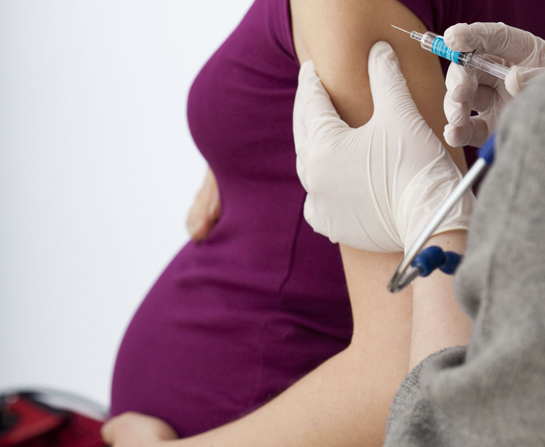Taking a Shot for Two
May 7, 2022 Return

For every mother-to-be, she will do all in her power to ensure the safety and well-being of the little one she is carrying. However, many often overlook one important aspect of protection: immunization.
Women are generally encouraged to get immunized before pregnancy, as not all vaccines are safe during pregnancy. Doing so allows her to build up a store of antibodies and strengthen her immune system before pregnancy (which is when the immune system is naturally weaker than normal). If she has not been able to get herself immunized prior to pregnancy, it is advisable to do so post-pregnancy, as most vaccines are safe during breast-feeding. However, healthcare practitioners will ultimately decide if the benefits of getting immunized outweigh the risks to the mother and baby.
The following few vaccines are considered safe for pregnant women who may have a risk of infection:
- Hepatitis B – Hepatitis B is a serious infectious disease commonly transmitted from an infected mother to her child during childbirth. It affects the liver, and can be potentially life-threatening. Women who yet to receive this shot when they were younger, and are found to be at high risk of contracting this disease while testing negative for the virus can receive this vaccine.
- Influenza – A bout of serious influenza infection can cause severe complications during pregnancy. The influenza quadrivalent vaccine can protect the mother from a serious infection during pregnancy. It can be received before pregnancy, or at any stage of pregnancy, or after pregnancy. It is quite safe for both the mother and her baby.
- Tetanus/ Diphtheria/ Pertussis – This combination vaccination, also referred to as the adult DTaP (diphtheria, tetanus, acellular pertussis) vaccine is recommended in the third trimester of pregnancy, ideally between 27 and 32 weeks of gestation. Newborns are too young to receive vaccinations against these three potentially life-threatening diseases, so it is up to the mother and the other adults around the newborn child to protect him or her from these diseases. Women who have not received this shot should consult the doctor on the possibility of getting it.
For most of the other adult vaccines, their safety during pregnancy has yet to be established. It is best to discuss them with your doctor, so your doctor can then assess the benefits against the risks of these shots for you.
References:
1. BabyCenter. Available at www.babycenter.com
2. Centers for Disease Control and Prevention. Available at www.cdc.gov
If you like this article, do subscribe here.
